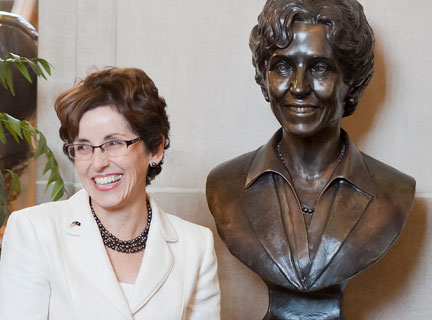About Dr. Córdova
France A. Córdova became Purdue University’s eleventh president on July 16, 2007, as well as professor of physics and astronomy. She was the first woman to lead the institution. While at Purdue she oversaw a strategic plan that emphasized student success, research deliverables and global engagement. She led Purdue to record levels of research funding, reputational rankings, and student retention rates and expanded its role as a top research institution on the global stage.
Prior to joining Purdue, Córdova served as chancellor and distinguished professor of physics and astronomy at the University of California (UC) Riverside from 2002 to 2007. At UC Riverside she was instrumental in launching a medical school and a community-university art museum complex. Under her watch, UC Riverside became a national model for the academic success of underrepresented students.
An internationally recognized astrophysicist, Córdova served from 1996 to 2002 as a professor of physics and vice chancellor for research at UC Santa Barbara and initiated a "Research Across Disciplines" program that funded and encouraged both interdisciplinary and "blue sky" projects. Before joining UC Santa Barbara, she was chief scientist at NASA from 1993 to 1996, serving as the primary scientific advisor to the NASA administration and the principal interface between NASA headquarters and the broader scientific community. In that role she evaluated the science mission and budget for NASA and worked with the National Science and Technology Council, federal government agencies, and National Academies on a broad range of science policy initiatives. Córdova formerly instructed courses in astrobiology and leadership development.
Córdova's scientific career contributions have been in the areas of observational and experimental astrophysics, multi-spectral research on x-ray and gamma ray sources, and space-borne instrumentation. She has published more than 200 scientific and public policy journal articles, reports, and conference abstracts. She was co-principal investigator for a telescope experiment that is currently flying on the satellite XMM-Newton, a cornerstone mission of the European Space Agency. She is the winner of NASA's highest honor, the Distinguished Service Medal, and was recognized as a 2000 Kilby Laureate for “contributions to society through science, technology, innovation, invention, and education.” Córdova was previously included as one of "America's 100 Brightest Scientists Under 40" by Science Digest magazine and recently appeared among the 101 Top Influential Leaders in Hispanic U.S. by Latino Leaders magazine.
Córdova was elected to the American Academy of Arts and Sciences in 2008 and is a national associate of the National Academies. She is a fellow of the American Association for the Advancement of Science (AAAS) and the Association for Women in Science (AWIS). Córdova has had several presidential appointments, including the Committee for the National Medal of Science. She is currently serving a six-year presidential appointment to the National Science Board, effective November 2008 and was confirmed as a citizen member of the Smithsonian Institution's Board of Regents in September 2009. In September 2011, Dr. Cordova was elected as the chair of the Smithsonian Board of Regents, a three-year term that began in January 2012.
While serving as president of Purdue, Córdova was on the board of directors of BioCrossroads, Indiana's initiative to grow the life sciences through a public-private collaboration. She was a member of the board of the Central Indiana Corporate Partnership, the Indiana Energy Systems Network, and the Indiana Chamber of Commerce.
Córdova is on the boards of Edison International, Science Applications International Corporation, and the Mayo Clinic. She is a past member of the boards of the American Council on Education and the National Association of State Universities and Land Grant Colleges. She is a present or past member of several science and security policy committees for the National Research Council and the American Academy of Arts and Sciences.
The oldest of twelve children, Córdova attended Stanford University, where she graduated cum laude with a bachelor's degree in English in less than four years. Among other activities, Córdova conducted anthropological fieldwork in a Zapotec Indian pueblo in Oaxaca, Mexico, and won a national writing competition to be a Mademoiselle magazine guest editor. She went on to earn her PhD in physics from the California Institute of Technology, and in 1997, she was awarded an honorary doctorate by Loyola Marymount University, Los Angeles. In 2007, Córdova was given Caltech’s Distinguished Alumni Award, and she was named to Stanford’s Multicultural Hall of Fame in 2008. In May 2011, she was awarded an honorary doctorate from Ben Gurion University of the Negev.
Córdova is married to Christian J. Foster, a science educator, and they have two adult children.


